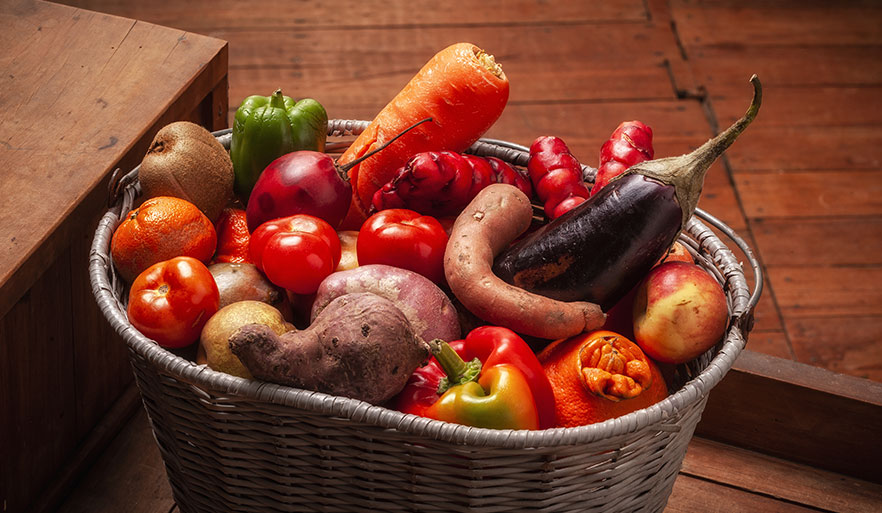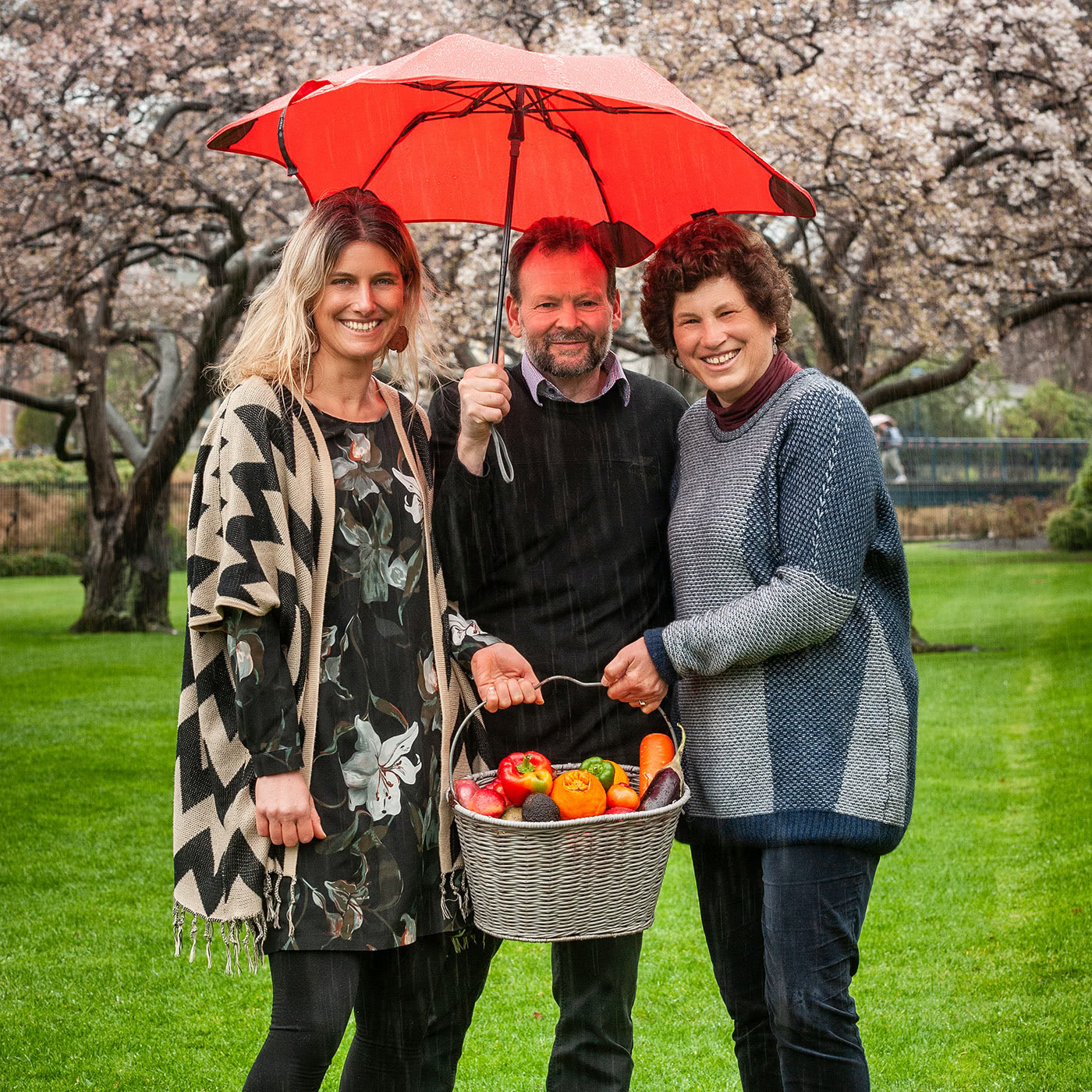Waste
not…
Otago's new Food Waste Innovation Research Theme brings together multidisciplinary expertise to address the complex problem of food waste, offering positive outcomes for society, the economy and the environment.
University of Otago researchers are seeking solutions to a global problem that could turn into a win-win situation for humankind and the planet.
While people in some parts of the world are starving, people in wealthier countries are throwing away enough food to feed them all – and that waste makes a major contribution to climate change.
Associate Professor Miranda Mirosa (Food Science) is director of the University's new Research Theme, Food Waste Innovation – Auahatanga Parakai – which launched in October.
“I'm really excited about food waste because a lot of the solutions are quite simple. We don't have to radically change what we are eating, but we do have to make changes to the way we think about food and how we treat it.
“Food waste is everybody's responsibility so everyone should get involved. It's a winnable issue and solving it really can help society, the economy and the environment.”
United Nations' estimates suggest that about eight per cent of annual global greenhouse gas emissions are generated by the 1.4 billion tonnes of food wasted each year. About a third of the food produced for human consumption does not get eaten. Yet more than 800 million people are going hungry.
Among the UN's Sustainable Development Goals is Target 12.3, which aims to halve food waste across the world by 2030. Mirosa's teams are supporting that target, investigating how and why food is wasted, and devising social and technical innovations to reduce it happening.
“We've been working on this issue for a number of years as individuals and in small collaborations,” says Mirosa. “Research Theme funding for the next four years allows us to scale up and co-ordinate internal and external research teams for specific projects.
"Achieving food waste reduction will require big acts by big players, as well as millions of acts by everyone from farmers to consumers. We need to understand behaviour better, of both producers and consumers. We have to look at what we are doing and how we might change what we do to reduce food waste.”
Otago's new Food Waste Innovation Research Theme brings together multidisciplinary expertise to address the complex problem of food waste, offering positive outcomes for society, the economy and the environment.
“The issue of food waste has been gaining momentum over the last five years, with interest ramping up recently nationally at government level and among businesses and the public.”
Mirosa will continue her role as a government consultant, following on from her “Mirosa Report” prepared for the 2020 Parliamentary Environmental Committee investigating food waste. She recommended that key stakeholders needed to develop a national consensus about how to tackle waste, gather data and take action now.
“New Zealand is lagging behind international efforts to combat food waste, which is surprising given our clean green image. We should be at the forefront of issues like these, but we've only really just got started with the government recently committing to establish a definition and measure of food waste and to include a food waste reduction target as part of a new waste strategy for New Zealand. We need to move fast.
“Otago is New Zealand's leading provider of research into food waste, which is why this latest Research Theme is so important. We can now gather all the multidisciplinary work that is being done and make it accessible to government, industry and the public.
“This issue has the potential to engage everyone, including the private sector, because solutions save money. Calculations show a median return of $14 for every dollar invested in food waste reduction initiatives.”
Many businesses in the food supply chain are already official supporters of the Research Theme as well as involved in New Zealand Food Waste Champions 12.3, a coalition co-chaired by Mirosa and committed to meeting the UN goal of halving waste by 2030 (nzchampions123.org).
The University of Otago's Food Waste Innovation team is currently running three research sub-themes: social innovations, measuring waste, and technical innovations, respectively led by Mirosa, Professor Sheila Skeaff (Human Nutrition) and Professor Phil Bremer (Food Science).
Skeaff, research leader for metrics and management, wants to understand the volume and nature of food being thrown away. “If we don't really know how much waste we have now we can't meet a target of halving it.”
Data collection along the food supply chain from growers to consumers, including post-harvest, food outlets and retail, will provide a baseline to work from when developing waste prevention strategies designed to have the biggest impact with the least resources.

“Farmers and retailers have a good handle on how much is being wasted and are pretty good at keeping it to a minimum,” says Skeaff. “It's just good business sense, but there are gaps and there is a lot of wastage by end-users. As consumers we need to change our mindsets and smarten up.
“A lot of people don't know what they are doing wrong and need help to find the right ways to reduce waste, especially in the home. It needs effort and behavioural change. Fortunately young people are very environmentally aware and want to tackle the problems. But it's going to take time.”
Economic drivers are effective for both businesses and consumers, and COVID-19 has highlighted the importance of food, says Skeaff. “During lockdown we realised how basic a need food is. We also discovered how fragile our food system is. For example, when imported food ingredients are no longer available, that can stop production. We need to better use the foods we produce in New Zealand and rely less on imported, highly-processed products.”
Food has a lot to answer for. The EAT-Lancet Commission on Food, Planet, Health estimates that a future planet population of 10 billion could be fed a healthy diet in theory, but only if we transform our eating habits by reducing our intake of animal foods and moving to a more plant-based diet, improving food production and reducing food waste.
Reports from almost 40 world-leading scientists led the commission to conclude that global food production is the single largest driver of environmental degradation, climate instability and the transgression of planetary boundaries.
Research being done by Food Waste Innovation is both timely and vital, says Skeaff, and data will help to inform responses to the issues. “This is definitely a good start. It's a complicated issue with lots of players and we will need a lot of people across a variety of sectors to work on it. What gets measured has a better chance to get managed.”
Mirosa, research leader for social innovations, sees the new Research Theme as a positive step after her recommendation to parliament that better co-ordination is needed to reduce food waste.
"Achieving food waste reduction will require big acts by big players, as well as millions of acts by everyone from farmers to consumers. We need to understand behaviour better, of both producers and consumers. We have to look at what we are doing and how we might change what we do to reduce food waste.
“We need to get researchers together with representatives from all parts of the food supply chain so they can ask questions of each other and let each other know how they can help. We need to match research and practical applications. And we need to showcase success stories and see what went well and what we can improve.
“There are huge gains for the national economy and the public in general, which is a win on the social front. We need that progress, especially since finding that during the COVID pandemic one in five New Zealanders were recorded as having faced food insecurity.”
Bremer, research leader for technical innovations, sees the Research Theme as the natural result of the number of people investigating related topics reaching critical mass.
“The Department of Food Science has been interested in this for a long time, but only lately has this explicitly fallen under the labels of sustainability and food waste,” he says. “We already have strong connections with industry, learning about their product streams and their possibilities and limitations, and helping them with innovation.”
Work includes finding uses for what is currently considered food waste. That may involve finding values within a waste product by breaking it down into its component parts and using them as raw materials to manufacture something new.
“We have already investigated uses for fish, meat, fruit 'waste' and even some shells, but there are many more possibilities to explore. Those could include turning products such as bread and milk, when they get close to their sell-by dates, into new products that could subsequently be sold.
“No one likes to see things thrown out, but up-cycling is still a fairly new idea for the general consumer and there has to be a need in the market for it to work. Once people might not have been interested in buying a recycled product, but now it is fashionable to act and buy responsibly. Sustainability is a big driver now.”
Turning what was once considered waste into marketable food requires a wide range of skills.
“We need food scientists to work on what we can make and how, sensory scientists to ensure that any new product appeals to customers' tastes, food safety experts to ensure it is safe, nutritionists to ensure it is healthy and marketing specialists to investigate consumer behaviour. It involves disciplines such as food science, microbiology, nutrition, chemistry and marketing. The Research Theme will make bringing teams of experts together a lot easier.”
There is strong support for change, says Mirosa. "Our goal with the Research Theme is to use this support to harness the best scientific expertise to provide effective solutions to Aotearoa's food waste problems.”
NIGEL ZEGA
For further information:
Food Waste Innovation – Auahatanga Parakai
If your organisation is interested in becoming a supporter, please email the research teams at food.waste@otago.ac.nz
Research Theme leaders Associate Professor Miranda Mirosa, Professor Phil Bremer and Professor Sheila Skeaff. They are working to measure food waste, develop reduction strategies, apply innovative technologies, and help modify producer and consumer behaviours.
